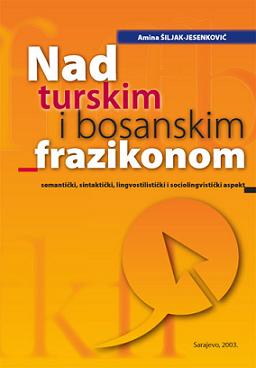
Contributions to Oriental Philology / Revue de Philologie Orientale
Prilozi za orijentalnu filologiju
The Institute for Oriental Studies in Sarajevo was established in August 1950 by a Decree of the Government of the People's Republic of Bosnia and Herzegovina (Official Gazette of NR BiH, No 20/50). In 1967, the SR BiH Assembly passed the Act on The Institute for Oriental Studies in Sarajevo (Official Gazette of SR BiH, No 23/67) and then in 1977 (Official Gazette of SR BiH, Nos 20/77 and 40/85) thereby taking over the founders' rights on the Institute. In accordance with the Act on Scientific-Research Work (Official Gazette of SR BiH, No 38/90, the Institute for Oriental Studies was included in the list of research institutions under No 3 as a public research institution. As of 1 st March 1992, the Institute for Oriental Studies and its financing was taken care of by the Ministry of Education, Science, Culture and Sport, the Government of the R BiH. During the 1992-1995 aggression against Bosnia and Herzegovina, the Institute, as a research institution, was proclaimed an institution of special relevance for the R BiH. After the Dayton Peace Agreements of November 1995, the Institute for Oriental Studies came within the competence of the Federal Ministry of Education, Science, Culture and Sport. With the adoption of the Act on University Education (Official Gazette of the Sarajevo Canton, No 17/99), the founder's rights over the Institute for Oriental Studies and its financing were taken over by the Canton of Sarajevo. The Institute became an associate member of Sarajevo University and continued operating as a public scientific-research institutio. Tasks of the Institute for Oriental Studies are to: -collect, classify, process and publish Oriental manuscrpts and archival materials and sources for the history of Bosnia and Hercegovina, -study the Arabic, Turkish and Persian languages and their literature, and to study their elements in the Bosnian language and culture, -study the cultural heritage of the Bosniaks in Oriental languages, -study the issues of social, political, economic and cultural history of Bosnia and Hercegovina during the Ottoman rule, within the Ottoman studies, -study Oriental arts, first of all in the territory of Bosnia and Herzegovina, -work on the development of scientific and professional staff in Oriental studies, -cooperate with cognate institutions and organizations, as well as with individual research workers in the country and abroad, -publish the results of its scientific-research, and professional work and make them available for the public through its publications-journals Prilozi za orijentalnu filologiju and editions such as Posebna izdanja and Monumenta Turcica Historiam Slavorum Meridionalium Illustrantia.
More...
